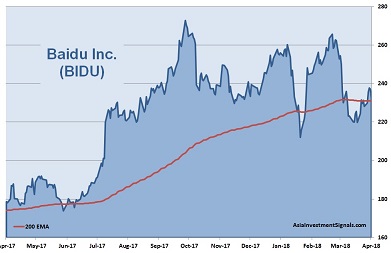 Baidu Inc. (BIDU) is the second largest internet search engine in the world and the leading search engine in China. The Baidu.com website has a market share of more than 70 percent in China and is the fourth largest website globally by average daily visitors and page views. Furthermore, Baidu is one of the highest ranked brands in China and among the top 100 most valuable brands in the country.[mepr-active membership=”1734″ ifallowed=”show” unauth=”message” unauth_message=”Please login or purchase a membership to view full text.”]
Baidu Inc. (BIDU) is the second largest internet search engine in the world and the leading search engine in China. The Baidu.com website has a market share of more than 70 percent in China and is the fourth largest website globally by average daily visitors and page views. Furthermore, Baidu is one of the highest ranked brands in China and among the top 100 most valuable brands in the country.[mepr-active membership=”1734″ ifallowed=”show” unauth=”message” unauth_message=”Please login or purchase a membership to view full text.”]
The company operated two segments so far. Baidu Core generates around 80 percent of the revenues with keyword-based marketing services triggered by search queries of internet users. iQiyi has been the second business segment before it spun off in an IPO last month. iQiyi is the leading video streaming service provider in China with over 420m MAUs and almost 59m paying subscribers. iQiyi generated around 20 percent of the company’s revenues. After the IPO, Baidu owns still 70 percent of the company. Baidu operates primarily in China. 98 percent of the revenues are generated in the domestic market.
Baidu was founded in 2000 and is headquartered in Beijing. The company is listed on the Nasdaq since 2005 and is the first Chinese company to be included in the NASDAQ-100 index. The company’s shares can also be traded in Germany, UK, Singapore, Mexico, Austria, and Switzerland. Major shareholder is the CEO Robin Yanhong Li with an ownership of around 16 percent, followed by the UK investment firm Baillie Gifford & Co. with an ownership of about 7 percent. About 73 percent of the shares are in public hand.
With a workforce of almost 40,000 employees, Baidu reported revenues of 84.8bn RMB (13bn USD) and profits before tax of 21.3bn RMB (3.3bn USD) in 2017. This is an increase of 20 and 47 percent respectively compared to the same period a year ago. In 2016, revenues rose by 6 percent, while profits dropped 62 percent. The operating margin of 19 percent is around industry average. Baidu’s cash reserves increased by 2 percent to 11bn RMB (1.7bn USD) in 2017. The company shows a robust balance sheet with good profitability and financial strength. The equity ratio is at 46 percent and the gearing, defined here as total liabilities to total equity, at still acceptable 118 percent. Moody’s current rating of Baidu is A3 with a stable outlook. Next results will be announced on 26.April.
After a peak in October 2017, Baidu’s shares entered in a sideward trend and finished the year with around 27 percent. The shares are up 8 percent this year. The company is priced at 28 times earnings. The shares trade at four times book value and at 17 times operating cash flow. The company pays no dividend. The opinion of most covering analysts is divided between hold and buy.
Baidu shows a healthy balance sheet with good profitability and financial strength. Revenues grew by 18 percent over the last three years. The company’s strong brand and its leading technology justify partly the high valuation. Baidu, sometimes called the Google and Netflix of China, is still operating in a well-protected market. But the competition becomes more intense. Baidu is recently very active in fields such as autonomous driving, artificial intelligence, and blockchain technology and entered several strategic partnerships that could be the next growth drivers for the company.
The fantasy for future earning potentials from these new technologies and good results in Q1, which will be announced this week, could bring the share price back to old highs at 270 USD and above.
AIS Rating: ★★★★☆
| 2012 | 2013 | 2014 | 2015 | 2016 | 2017 | |
|---|---|---|---|---|---|---|
| EPS (RMB) | 298.3 | 299.3 | 373.4 | 951.5 | 318.6 | 524.1 |
| Change | 57% | 0% | 25% | 155% | -67% | 64% |
| P/E | P/E SECTOR |
P/B | P/CF | Equity Ratio* |
ROE | LIAB./ Equity** |
Div YLD |
|---|---|---|---|---|---|---|---|
| 28 | 13 | 4.4 | 17 | 46% | 18% | 118% | n/a |
* Equity / Total Assets, ** Total Liabilities / Equity
[/mepr-active]
